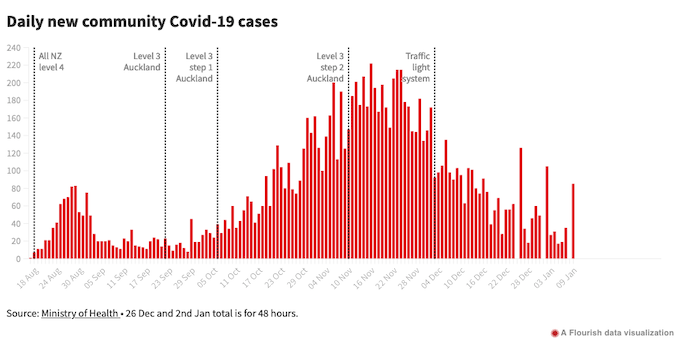
By Jean Bell, RNZ News journalist
New Zealand covid-19 experts are nervously observing an ever-increasing number of cases at the border, as the threat of an omicron outbreak looms.
The highly transmissible variant has rapidly spread around the globe and New Zealand has dodged a community outbreak so far.
But with the escalating number of overseas returnees testing positive, there are fears a new wave of the virus could be out in the community within weeks.
- LISTEN TO RNZ MORNING REPORT: ‘We’re kind of back where we started again” – Microbiologist Dr Siouxsie Wiles
- NZ covid-19 experts copping abuse from anti-vaxxers
- Other NZ covid outbreak reports
Epidemiologist and University of Otago professor Michael Baker called the variant a “huge threat” and said it was not a matter of if there was an outbreak, but when.
Professor Baker was concerned there may have been undetected transmission of the virus — whether that was the delta or omicron variant — during the Christmas and New Year period.
“It will take a while for people to people to develop symptoms if they were exposed. Everyone should be aware of getting any cold or flu symptoms, which is unusual for this time of year.”

MIQ hotels well set up
A Managed Isolation and Quarantine (MIQ) spokesperson told RNZ the hotels were well set up to cater for omicron cases and a number of precautionary measures were in place to manage the risk.
This included travellers staying 10 days in MIQ and undergoing four tests during that time.
Anyone who tested positive was treated as an omicron case until proven otherwise by genome sequencing.
Despite these measures, Dr Baker was doubtful the country could make it through the month without the omicron variant escaping.
“We’re getting more than 20 cases a day in the last three days. That’s going to put huge strain on the MIQ system, as we know every infected that arrives increases the risk of border failure.”
Microbiologist Dr Siouxsie Wiles, who is an associate professor at the University of Auckland, told RNZ Morning Report that rather than embracing the arrival of the new variant as some have done, Aotearoa needed to be prepared for its arrival.
‘Back to where we started’
“We’re kind of back where we started again, and what we really need to be doing is trying to delay that coming into our community for as long as possible so we can get everybody with that third booster dose and so that we can also get the vaccine rollout started and hopefully finished with our children,” she said.
“There is no controlled spread with omicron, I think it’s an absolutely ridiculous idea.
“There’s being prepared for it to come and then there’s welcoming it with open arms and all we have to look at is everywhere around the world doing open arms and it’s just not working at all.”
There were 64 new border-related cases in MIQ during the weekend, bringing the total to 227.
University of Otago senior lecturer Dr Lesley Gray said this did not bode well.
“We know that for every approximately 100 that we have in MIQ there is a risk that there might be one that might end up in the community.”
From January 7, travellers to New Zealand must return a negative test within 48 hours of their departure, down from 72 hours.
Catching virus in short time-frame
Director of Public Health Dr Caroline McElnay had previously said that people may have been incubating covid-19 before their flight or been exposed during their travel.
Dr Gray was concerned people were catching the virus within that short-time frame.
“We do have to ask the questions of ‘how, what, when, and why’. As these people travel, they’re distanced for the most part on the planes, when they’re in airports they’re wearing masks and they have to take a reasonable number of precautions,” she said.
She urged New Zealanders to ask themselves if they were ready for an omicron outbreak.
This included having adequate supplies and a suitable place to quarantine if needed.
She said getting a booster shot, scanning in, mask-wearing, and testing were among the best tools to tackle omicron.
This article is republished under a community partnership agreement with RNZ.











































